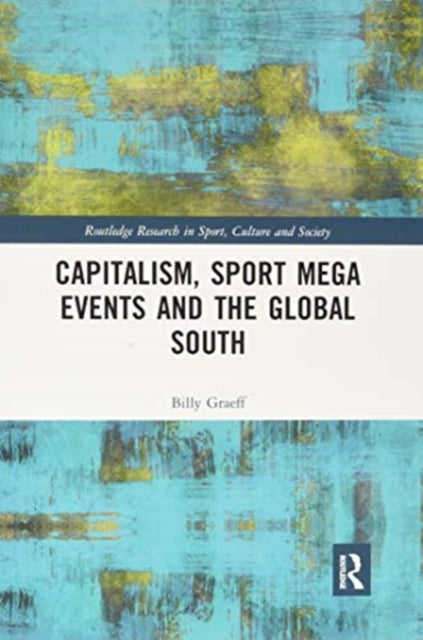Billy Graeff
Capitalism, Sport Mega Events and the Global South
Capitalism, Sport Mega Events and the Global South
YOU SAVE £2.02
- Condition: Brand new
- UK Delivery times: Usually arrives within 2 - 3 working days
- UK Shipping: Fee starts at £2.39. Subject to product weight & dimension
Bulk ordering. Want 15 or more copies? Get a personalised quote and bigger discounts. Learn more about bulk orders.
Couldn't load pickup availability
- More about Capitalism, Sport Mega Events and the Global South
The book Capitalism,Sport Mega Events, and the Global South explores the socioeconomic impact of these events on host countries in the Global South, using a case study of the 2014 FIFA World Cup in Brazil to examine how residents perceived the effects. It is a valuable resource for students and scholars interested in sport mega events, sport tourism, international development, sport geography, and the sociology of sport.
Format: Paperback / softback
Length: 194 pages
Publication date: 31 March 2021
Publisher: Taylor & Francis Ltd
The social, political, and economic consequences of hosting sport mega events like the Olympics and the World Cup are far-reaching and complex. These events bring together people from all over the world, generating significant economic benefits, promoting cultural exchange, and fostering international cooperation. However, they also raise important questions about sustainability, social inequality, and the impact on local communities.
Social Consequences:
One of the primary social consequences of hosting sport mega events is the increased visibility and recognition of host countries and cities. These events attract millions of spectators and media attention, which can boost tourism, promote cultural exchange, and enhance the international reputation of a region. However, this increased visibility can also lead to social tensions and conflicts, particularly if the host country lacks the infrastructure and resources to accommodate the influx of visitors.
Another social consequence is the impact on local communities. Sport mega events can create job opportunities, stimulate economic growth, and improve infrastructure. However, they can also displace local residents, increase housing costs, and lead to environmental degradation. For example, the construction of stadiums and other infrastructure for the 2014 FIFA World Cup in Brazil led to the eviction of thousands of people from their homes and the destruction of natural habitats.
Political Consequences:
Hosting sport mega events can also have significant political consequences. These events can be used as tools for political propaganda, nationalism, and social exclusion. For example, the 2014 FIFA World Cup in Brazil was heavily politicized, with the Brazilian government using the event to promote its image as a developing country and to address social and economic issues. However, this politicization of sport can also lead to tensions and conflicts, particularly if the event is perceived as being used for political gain rather than for the benefit of the community.
Economic Consequences:
The economic consequences of hosting sport mega events are substantial. These events generate significant revenue through ticket sales, tourism, and broadcasting rights. They can also create job opportunities and stimulate economic growth in the host region. However, they can also have negative economic consequences, particularly if the host country lacks the infrastructure and resources to accommodate the influx of visitors.
For example, the 2014 FIFA World Cup in Brazil generated billions of dollars in revenue, but it also led to significant debt and financial instability in the country. The government spent heavily on infrastructure and security, which resulted in a large budget deficit and increased public debt. This has had long-term consequences for the Brazilian economy, particularly in terms of economic growth and social inequality.
In conclusion, hosting sport mega events like the Olympics and the World Cup can have significant social, political, and economic consequences. While these events can bring significant benefits, they can also lead to social tensions, environmental degradation, political polarization, and economic instability. It is important for host countries to carefully consider the potential impacts of these events and to work towards ensuring that they are sustainable, inclusive, and beneficial for the community.
Weight: 386g
Dimension: 234 x 156 (mm)
ISBN-13: 9780367784539
This item can be found in:
UK and International shipping information
UK and International shipping information
UK Delivery and returns information:
- Delivery within 2 - 3 days when ordering in the UK.
- Shipping fee for UK customers from £2.39. Fully tracked shipping service available.
- Returns policy: Return within 30 days of receipt for full refund.
International deliveries:
Shulph Ink now ships to Australia, Belgium, Canada, France, Germany, Ireland, Italy, India, Luxembourg Saudi Arabia, Singapore, Spain, Netherlands, New Zealand, United Arab Emirates, United States of America.
- Delivery times: within 5 - 10 days for international orders.
- Shipping fee: charges vary for overseas orders. Only tracked services are available for most international orders. Some countries have untracked shipping options.
- Customs charges: If ordering to addresses outside the United Kingdom, you may or may not incur additional customs and duties fees during local delivery.


